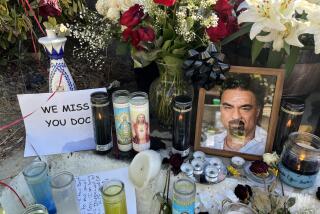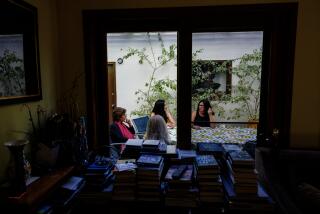Friends Call Slain Doctor ‘Courageous’
- Share via
AMHERST, N.Y. — The friends, family and co-workers of Dr. Barnett Slepian would like the rest of the world to know something about the man.
He wore jeans to the office. He was going on vacation next month. He raised money for the Buffalo zoo. He was a patron of the arts. He had a dry sense of humor, lots of friends and a wife and four sons. He got rid of his boat not because he was a lousy skipper--he was--but because he wanted to spend more time watching his boys play sports.
And he delivered babies, two of them to Jill Polet, who flew in from the Netherlands to be with his family after she heard he died because he did something--perform abortions--that she said was only a small part of who this obstetrician/gynecologist was.
“He was a wonderful physician,” said Polet, who also once worked as a counselor in his clinic. “I trusted him with my life. I trusted him with the life of my children.”
A gunman crept up to the wooded backyard of Slepian’s stately Tudor home Friday night and fired a single bullet through a window. It entered the 52-year-old doctor’s back as he sat in his kitchen with his family, tore through his aorta and narrowly missed his eldest boy, a junior varsity quarterback, when the round exited Slepian’s body. He was the fifth abortion provider shot by a sniper in upstate New York and Canada since 1994--and the first of them to die.
All of the attacks occurred within a few weeks of Nov. 11, which is Veterans Day in the United States and Remembrance Day in Canada. A task force of investigators from the two nations was gathered in this upscale suburb of Buffalo on Sunday to assist Amherst police in trying to solve what may be the latest and deadliest of these attacks.
Winnipeg Inspector Keith McCaskill, a member of the task force, said he wrote a press release last week warning doctors and police agencies in both countries to be prepared for another such attack. “We’re still a little shocked that it did happen,” he said.
The four earlier incidents were carried out in secluded areas by somebody armed with a high-powered rifle, and McCaskill said authorities believe the culprit or culprits were the same in each case, even though the shootings ranged from Vancouver to New York. He said he didn’t have enough evidence yet about the Amherst case, but “the similarities are striking.”
He also said the authorities were aware of an Internet site that appears to advocate violence against abortion rights proponents--and which includes Slepian’s name, now dramatically crossed out, on a list of purported abortion providers. But he wouldn’t say whether authorities believe the people behind the Web site have inside knowledge of the shootings.
For Slepian, who his lawyer says used to wear a bulletproof vest, the killing was the end of his role in a struggle taking place in many American cities in which anti-abortion advocates attempt to publicly identify doctors willing to provide abortions. Even the day after he died, anti-abortion protesters who had staked out his home and offices for more than a decade were demonstrating at a clinic where he worked, just as they had done every Saturday and just as they planned to do in the future.
In 1988, demonstrators serenaded Slepian outside his home with chants of “murderer” while he celebrated Hanukkah with his family. He came outside and smashed the window of a van owned by one of the protesters with a baseball bat. He was arrested on an assault charge and led away in handcuffs. He ultimately pleaded guilty to disorderly conduct and paid $400 for damages.
Friends said Slepian’s resolve was surprising for somebody who they said was mild-mannered and unassuming.
“He said to me, ‘I will not be intimidated,’ ” said lawyer Harvey Rogers, who represented Slepian in the case. After the incident, the town passed an ordinance banning pickets of private homes, but protesters countered by staging rallies covering entire blocks.
Rogers said Slepian wore a bulletproof vest until two or three years ago.
Polet, who moved to the Netherlands several years ago, said: “We would climb over the protesters to get to the door. Every week we would break through the barricades and have people yelling at us as we walked in.”
Bob Behn, the head of the anti-abortion Operation Rescue group in Buffalo, called the killing “a terrible thing” and said the killer should be brought to justice, but he also equated the murder with abortion. “I think it was a pro-choice person who took his life. Somebody decided he was expendable and took him out.”
A year ago, Behn said he and other protesters were gathered in a parking lot and preparing to make a “house call”--a protest at the home of somebody who was believed to perform abortions--when Slepian came up to the group and offered to meet with Behn. The two arranged to have breakfast.
“We talked for a couple hours,” Behn said. “He was not mean or nasty. If he wasn’t an abortionist, we probably could have gotten along.”
Slepian asked if he could speak at an anti-abortion rally, but Behn said he refused because he thought it would agitate abortion opponents. Behn denied that the emotions were such that the group would lead anyone affiliated with it to kill the doctor. “Whoever killed Dr. Slepian was wrong, just as it’s wrong for a doctor to decide that a pregnant woman should kill her baby,” he said.
He said his group staged their weekly protest Saturday at the clinic where Slepian worked, and that “some pro-choice people were yelling at us that it was our fault.”
The killing brought an outpouring of comments from friends and patients.
“The man was the most compassionate doctor I’ve ever met,” said Eva Rubenstein, an Amherst lawyer and nurse who said Slepian delivered her son three years ago.
“He took care of all types of women, women who had diabetes and cancer,” said Dr. Marc Kozinn, a cardiologist and friend of Slepian who also was one of the attending physicians when the mortally wounded doctor was brought to the hospital. “It’s not that he enjoyed [performing abortions]. He felt very strongly that it was a woman’s right. He said, ‘If I don’t provide safe, qualified medical care, who will?’ He didn’t want to go back to the old days, when women were forced to go to back-alley butchers.” Most shocking to most people was the way he died.
“They are trying to change the law through terrorism,” said Kozinn, who was among a group of couples who planned to vacation with Slepian and his wife in Las Vegas in November. “They feel if they can kill a wonderful man like Bart Slepian, they can stop other people.” Slepian and his family had come home from synagogue after saying a prayer on the anniversary of his father’s death, Kozinn said.
“I’m still in a state of shock,” said a sobbing Kozinn. “He was sitting in his own kitchen, in his own home, and a coward in the night stood in his backyard and shot him in his window in his back and his own family watched him die. I can only imagine what kind of monster would do this.
“How many people would have the courage to risk his own life, his own family? I don’t know if I would. He was a courageous man. This one violent act took so much from so many people.”
*
Times researcher John Beckham in Chicago contributed to this story.
More to Read
Sign up for Essential California
The most important California stories and recommendations in your inbox every morning.
You may occasionally receive promotional content from the Los Angeles Times.













